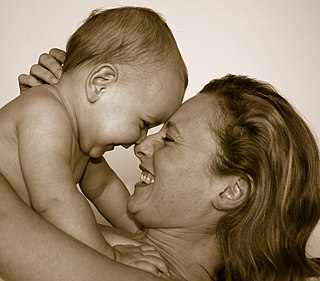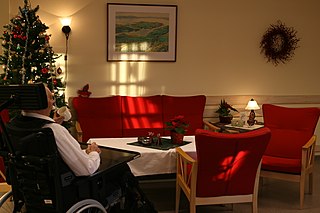Child care, otherwise known as day care, is the care and supervision of a child or multiple children at a time, whose ages range from six weeks to thirteen years. Child care is the action or skill of looking after children by a day-care center, nannies, babysitter, teachers or other providers. Child care is a broad topic that covers a wide spectrum of professionals, institutions, contexts, activities, and social and cultural conventions. Early child care is an equally important and often overlooked component of child development. Child care providers can be children's first teachers, and therefore play an integral role in systems of early childhood education. Quality care from a young age can have a substantial impact on the future successes of children. The main focus of childcare is on the development of the child, whether that be mental, social, or psychological.
Elder abuse is "a single, or repeated act, or lack of appropriate action, occurring within any relationship where there is an expectation of trust, which causes harm or distress to an older person." This definition has been adopted by the World Health Organization (WHO) from a definition put forward by Action on Elder Abuse in the UK. Laws protecting the elderly from abuse are similar to and related to, laws protecting dependent adults from abuse.
Terminal illness or end-stage disease is an incurable disease that cannot be adequately treated and is reasonably expected to result in the death of the patient. This term is more commonly used for progressive diseases such as cancer or advanced heart disease than for trauma. In popular use, it indicates a disease that will progress until death with near absolute certainty, regardless of treatment. A patient who has such an illness may be referred to as a terminal patient, terminally ill or simply terminal. There is no standardized life expectancy for a patient to be considered terminal, although it is generally months or less. Life expectancy for terminal patients is a rough estimate given by the physician based on previous data and does not always reflect true longevity. An illness which is lifelong but not fatal is a chronic condition.

Reactive attachment disorder (RAD) is described in clinical literature as a severe and relatively uncommon disorder that can affect children. RAD is characterized by markedly disturbed and developmentally inappropriate ways of relating socially in most contexts. It can take the form of a persistent failure to initiate or respond to most social interactions in a developmentally appropriate way—known as the "inhibited form". Due to recent revision in the DSM-5 the "disinhibited form" is now considered a separate diagnosis named "disinhibited attachment disorder".

Attachment theory is a psychological model attempting to describe the dynamics of long-term and short-term interpersonal relationships between humans. "Attachment theory is not formulated as a general theory of relationships; it addresses only a specific facet": how human beings respond in relationships when hurt, separated from loved ones, or perceiving a threat.

Elderly care, or simply eldercare, is the fulfillment of the special needs and requirements that are unique to senior citizens. This broad term encompasses such services as assisted living, adult day care, long term care, nursing homes, hospice care, and home care. Because of the wide variety of elderly care found nationally, as well as differentiating cultural perspectives on elderly citizens, cannot be limited to any one practice. For example, many countries in Asia use government-established elderly care quite infrequently, preferring the traditional methods of being cared for by younger generations of family members.

Leeza Kim Gibbons is an American talk show host. She is best known as a correspondent and co-host for Entertainment Tonight (1984–2000) as well as for having her own syndicated daytime talk show, Leeza (1993–2000). In 2013, her book Take 2 became a New York Times bestseller and she won the Daytime Emmy for Outstanding Host in a Lifestyle or Travel program for the PBS show, My Generation. On February 16, 2015, Leeza was named the winner of Celebrity Apprentice, having raised $714,000 for her charity Leeza's Care Connection.

Martin James "Marty" Schreiber is an American politician, publisher, author, and lobbyist, the 38th Lieutenant Governor of Wisconsin, and, the 39th Governor of Wisconsin from 1977 to 1979. Schreiber has become an advocate on issues related to Alzheimer's disease and dementia.
The Sandwich Generation is a generation of people who care for their aging parents while supporting their own children.
Respite care is planned or emergency temporary care provided to caregivers of a child or adult.
As populations age, caring for people with dementia has become more common. Elderly caregiving may consist of formal care and informal care. Formal care involves the services of community and medical partners, while informal care involves the support of family, friends, and local communities, but more often from spouses, adult children and other relatives. In most mild to medium cases of dementia, the caregiver is a family member, usually a spouse or adult child. Over time more professional care in the form of nursing and other supportive care may be required, whether at home or in a long term care facility.
Family caregivers are “relatives, friends, or neighbors who provide assistance related to an underlying physical or mental disability but who are unpaid for those services.”
Total care is where long-term care facilities for residents are responsible for meeting all the needs of a resident. While some residents receiving so-called total care may be able to independently meet all or some of their needs for their activities of daily living without the assistance of a caregiver, the facility and its staff have the duty of monitoring the resident to be sure s/he is having those needs met.
Caregiver syndrome or caregiver stress is a condition that strongly manifests exhaustion, anger, rage, or guilt resulting from unrelieved caring for a chronically ill patient. Although it is not listed in the Diagnostic and Statistical Manual of Mental Disorders, the term is often used by many healthcare professionals.
An informal or primary caregiver is an individual in a cancer patient's life that provides unpaid assistance and cancer-related care. Due to the typically late onset of cancer, caregivers are often the spouses and/or children of patients, but may also be parents, other family members, or close friends. Informal caregivers are a major form of support for the cancer patient because they provide most care outside of the hospital environment. This support includes:
Caregiving by country is the regional variation of caregiving practices as distinguished among countries.

The Fundamentals of Caring is a 2016 American comedy-drama film written and directed by Rob Burnett, based on the 2012 novel The Revised Fundamentals of Caregiving by Jonathan Evison and stars Paul Rudd, Craig Roberts, and Selena Gomez. The film had its world premiere at the Sundance Film Festival on January 29, 2016 and was released by Netflix on June 24, 2016.







